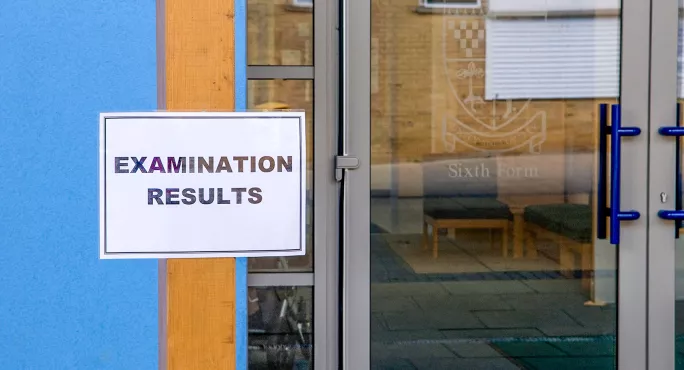GCSEs 2022: Exam board warning over ‘clickbait’ grades videos

Exam boards and school leaders have hit out at online videos that claim to know grade boundaries for upcoming GCSE and A-level exams.
Some videos available on YouTube are claiming to offer a guide to grade boundaries to students, despite them being set for GCSE and A-level qualifications after exams are taken.
The AQA exam board has said these videos are “unhelpful” and “misleading” and has warned pupils to “ignore” them.
- GCSEs 2022: How exams will differ this year
- Background: How do GCSE and A-level grade boundaries work?
- GCSEs 2023: How exams will be run next year
And school leaders have warned that they “prey” on the anxiety of those sitting the exams, who often put a lot of faith in them.
Today, the exam regulator Ofqual warned candidates not to rely on information in one particular video, which was from a YouTuber with over 50,000 subscribers and claimed to have “official” grade boundaries for the upcoming exams, after it was flagged by Tes.
The video, which has had over a quarter of a million views, listed grade boundaries for one specific AQA GCSE exam and told viewers that they would only move “by one, maximum, maximum, maximum two marks”.
An AQA spokesperson said students should “ignore videos like this” and added: “Grade boundaries are only set after exam papers have been marked, so it’s impossible for anyone to have them right now.
“Speculation like this is really unhelpful and misleading for students”, they added.
Similarly, Ofqual warned that grade boundaries for exams had not been set. A spokesperson for the regulator said: “The video does not constitute official advice and the content should not be relied upon.”
‘Reprehensible clickbait’
School leaders have also hit out at “reprehensible clickbait” videos that make claims about grade boundaries.
Laura May Rowlands, head of English at a secondary school in Southampton, said that videos with “clickbait” titles around grade boundaries displayed a “concerning lack of understanding around how grade boundaries and the bell curve are arrived at”.
She added: “On a deeper level they show a worrying lack of responsibility for the wellbeing of pupils who have already endured so much in the way of disruption and lack of clarity due to the pandemic.
“Producing clickbait that is misleading at best aimed at pupils looking for reassurance is utterly reprehensible.”
Caroline Spalding, an assistant headteacher at an all-through school in the Midlands said that at worst, such videos - seen as “leaked information on the internet” - have the “potential to create false confidence, conflict between pupils and their schools, and to ultimately create worse outcomes for the pupils that fall victim to them”, adding that content like this can “prey” on young people’s anxieties.
And Crispin Knell, a lead teacher in English at Space Studio, West London, warned that students often put “a lot of faith” in these types of content, “more than the experience of their teachers.”
Ofqual has previously published its approach to grading exams this summer in a government blog, explaining that after two summers with no GCSEs, it would aim to “reflect a midway point between 2021 and 2019”.
YouTube has been contacted for comment.
Register with Tes and you can read two free articles every month plus you'll have access to our range of award-winning newsletters.
Keep reading with our special offer!
You’ve reached your limit of free articles this month.
- Unlimited access to all Tes magazine content
- Save your favourite articles and gift them to your colleagues
- Exclusive subscriber-only stories
- Over 200,000 archived articles
- Unlimited access to all Tes magazine content
- Save your favourite articles and gift them to your colleagues
- Exclusive subscriber-only stories
- Over 200,000 archived articles
topics in this article



